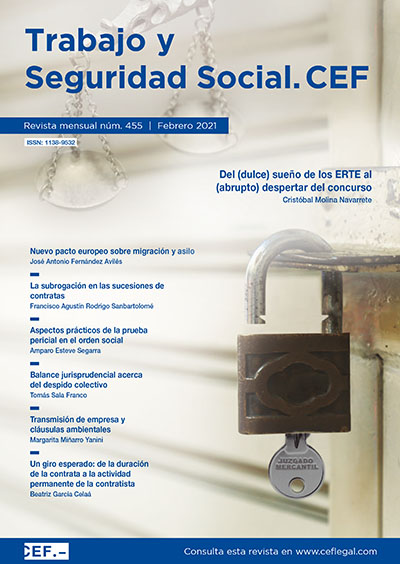From the (sweet) dream of the ERTE to the (abrupt) awakening of the bankruptcy: labor impact of an ultra vires «codification». With regard to the Royal Legislative Decree 1/2020, of 5 May, which approves the revised text of the Bankruptcy Law
DOI:
https://doi.org/10.51302/rtss.2021.2330Keywords:
Bankruptcy Law, insolvency, labor loans, interest in the bankruptcy, business succession, companies in crisisAbstract
The «exception laws» to face the economic crisis derived from the COVID-19 pandemic has wanted to delay the inevitable: the insolvency crises of many companies. But, in March 2021, the moratorium ends and the «new insolvency law» must come into force. In this sense, before transposing the 2019 Community Directive on restructuring and insolvency into domestic law (the deadline ends in July 2020), the Spanish Government preferred to carry out a recast, clarification and harmonization of the preceding Bankruptcy Law (2003). The objective sought is to have a clear regulation, to establish, later, a more efficient and coherent Business Crisis Law with the objective of rescuing companies and employment.
However, the new Spanish Bankruptcy Law has not limited itself to «clarifying» interpretative doubts, it has gone further. Therefore, this legislative option creates relevant problems due to its excess (ultra vires vice). Some labor aspects of the business competition (example: the transfer of production units) have undergone significant changes. This study makes a complete balance of the main labor and social security novelties of the new Bankruptcy Law, trying to purge those that have incurred an ultra vires vice.
Downloads
References
Alameda Castillo, María Teresa. (2020). Y también en medio de la tempestad… reforma concursal de 2020 (proyecciones laborales). Temas Laborales. Revista Andaluza de Trabajo y Bienestar Social, 153, 63-100.
Cano Marco, Francisco. (2020). Manual práctico de derecho laboral concursal (3.ª ed.). La Ley.
Falguera Baró, Miguel Ángel y Serna Calvo, Mar. (2020). El nuevo texto refundido de la Ley concursal: los cambios que afectan al derecho del trabajo y de la Seguridad Social. Ciudad del Trabajo, 34, 43-79.
Montoya Melgar, Alfredo. (2015). Derecho laboral concursal (2.ª ed.). Civitas.
Palomo Balda, Emilio. (2020). Trabajadores y empresas en concurso. Soluciones en las jurisdicciones civil (mercantil) y social. Lefebvre.
Puebla Pinilla, Ana de la y Mercader Uguina, Jesús R. (11 de diciembre de 2020). La nueva Ley concursal a debate: ¿vuelve la polémica sobre la sucesión de empresas en el concurso? El Foro de Labos. https://forodelabos.blogspot.com/2020/12/la-nueva-ley-concursal-debate-vuelve-la.html
UGT. (2020). El concurso y el ámbito laboral. Guía práctica concursal (partes I, II, III). https://servicioestudiosugt.com/archivo-analisis/


















